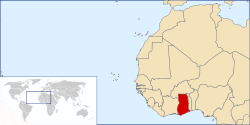Difference between revisions of "Highlife & Ghanaian nationalism"
| Line 5: | Line 5: | ||
'''Ghanaian popular music''' is involved in many ironies, in which American and Cuban culture (including Pan-Africanism and African American popular culture) -- inheriting from diverse African traditions -- plays a formative role in the constitution of Ghanaian nationalism, in its attempt to unify diverse ethnicities...themselves gathered in a post-colonial situation (i.e. Ghana = ex British Gold Coast & British Togoland). Tracing these ironies helps illuminate the complexity of the Ghanaian post-colonial situation. | '''Ghanaian popular music''' is involved in many ironies, in which American and Cuban culture (including Pan-Africanism and African American popular culture) -- inheriting from diverse African traditions -- plays a formative role in the constitution of Ghanaian nationalism, in its attempt to unify diverse ethnicities...themselves gathered in a post-colonial situation (i.e. Ghana = ex British Gold Coast & British Togoland). Tracing these ironies helps illuminate the complexity of the Ghanaian post-colonial situation. | ||
| − | '''The big picture''': Political structures resulting from reassembly of shards of colonial period are cemented by mass-media popular music (e.g. Highlife) and political ideas (e.g. Pan-Africanism) which are themselves significantly influenced by cultural-political currents coming directly from the | + | '''The big picture''': Political structures resulting from reassembly of shards of colonial period are cemented by mass-media popular music (e.g. Highlife) and political ideas (e.g. Pan-Africanism) which are themselves significantly influenced by cultural-political currents coming directly from the imperial/colonial powers, even if these currents can indirectly be traced back to Africa. Such a picture is very complex indeed! |
In 1957, Ghana was formed out of the combination of four territories: Northern Territories, Ashanti, British Togoland, and the Gold Coast Colony, all British-ruled. | In 1957, Ghana was formed out of the combination of four territories: Northern Territories, Ashanti, British Togoland, and the Gold Coast Colony, all British-ruled. | ||
Revision as of 15:16, 25 September 2007
Highlife Music & the complex relation between Western music, nationalism, and identity in Ghana following WWII.
Ghanaian popular music is involved in many ironies, in which American and Cuban culture (including Pan-Africanism and African American popular culture) -- inheriting from diverse African traditions -- plays a formative role in the constitution of Ghanaian nationalism, in its attempt to unify diverse ethnicities...themselves gathered in a post-colonial situation (i.e. Ghana = ex British Gold Coast & British Togoland). Tracing these ironies helps illuminate the complexity of the Ghanaian post-colonial situation.
The big picture: Political structures resulting from reassembly of shards of colonial period are cemented by mass-media popular music (e.g. Highlife) and political ideas (e.g. Pan-Africanism) which are themselves significantly influenced by cultural-political currents coming directly from the imperial/colonial powers, even if these currents can indirectly be traced back to Africa. Such a picture is very complex indeed!
In 1957, Ghana was formed out of the combination of four territories: Northern Territories, Ashanti, British Togoland, and the Gold Coast Colony, all British-ruled.
Musical forms of political and social expression
Professor John Collins:
“Artists and groups that have indigenized and de-acculturated popular performance should be considered as cultural heroes who have helped create a modern national identity…all have artistically contributed to the de-colonisation process”
(with thanks to Eilis Pourbaix & John Collins for their research)
